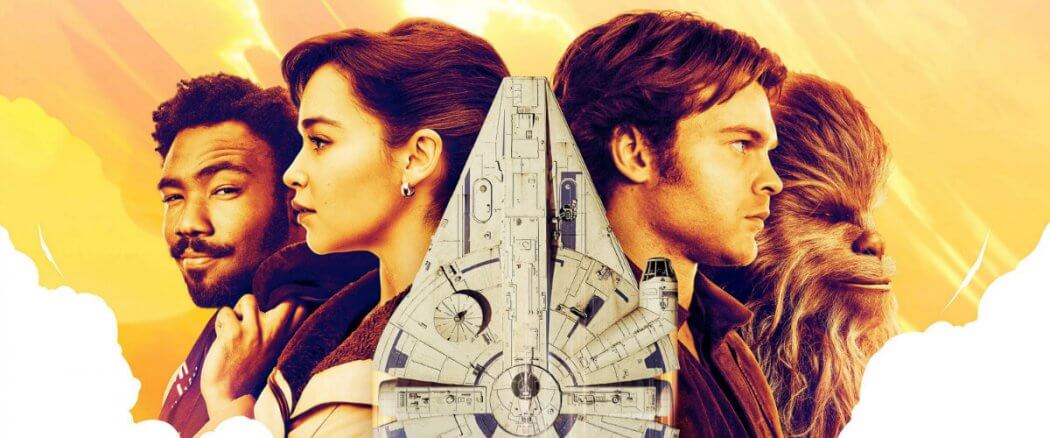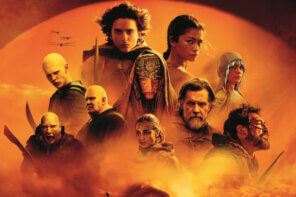In the continued Hollywood landscape of expanding universes and intellectual property mining, very few franchises feel at home apart from their source material. Comic book movies have, well, their comic books. Book series like Game of Thrones and old films like Westworld find their homes in prestige television ventures. But perhaps no existing franchise feels more at home in the unknown than Star Wars. After all, it’s in the name right? What feels more adventurous, more rapturously vague than the stars?
As the less-than-evil Disney empire continues thrusting the Star Wars canon headlong into the dark, cold universe, we’re starting to get a look at the world outside the lens of the main Skywalker-heavy plot. Sure, The Force Awakens and The Last Jedi have been (mostly) welcome additions to our galactic lexicon. But what is a story without its characters, and what good is Wonderland without an endless set of rabbit holes to fall into?
Solo: A Star Wars Story is the second of these tangential threads after 2016’s international blockbuster, Rogue One. While that film immersed Star Wars fans into a previously unseen part of the galaxy with a fresh set of faces, Solo is a classic prequel. It brings us into the backstory of the man who personified the “charming rogue,” the driving force behind many of today’s archetypal heroes and heroines.
But aside from the excitement of getting more of a somewhat proven quantity, is Solo worth millions of dollars of investment from fans and studio? Is it just as fun as the sci-fi operas of America’s film past? Forget all that: is it even necessary? Solo deals with these expectations and more over the course of its 2 hour, 15 minute run time, leaving behind a film that feels weighed down by its past despite a collection of parts that make up something quite impressive.
“If You Go With Us, You’re In This… For Good.”
From the opening scene, Solo feels like a film that is much aware of its narrative future and cultural past. Han Solo — or more specifically, Harrison Ford’s portrayal of him — is so effortlessly cool and smooth, there’s almost an expectation that he was this way from birth. We don’t have to go that far back to see Han’s origins, but we do quickly learn that Han’s effortless rebellion is grounded in a little more failure than we’re used to seeing.
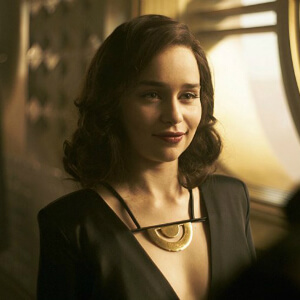 Alden Ehrenreich, giving a slightly uneven, but mostly up-to-snuff performance, finds Han’s hustler credentials in teenage pain and almost singular determination. Growing up on the mean streets of Corellia, Han earns an amateur’s reputation running odd jobs with his girlfriend Qi’Ra (more on Emilia Clarke in a bit) for a notoriously, but small-time, crime lord. It’s all in service of something grander, Han tells Qi’Ra. They’re going to buy a ship and see the universe together. But even in his dreams of being a galactic vagabond, there’s something else lurking beneath the surface. He wants to be a great pilot, he tells anyone and everyone who will listen.
Alden Ehrenreich, giving a slightly uneven, but mostly up-to-snuff performance, finds Han’s hustler credentials in teenage pain and almost singular determination. Growing up on the mean streets of Corellia, Han earns an amateur’s reputation running odd jobs with his girlfriend Qi’Ra (more on Emilia Clarke in a bit) for a notoriously, but small-time, crime lord. It’s all in service of something grander, Han tells Qi’Ra. They’re going to buy a ship and see the universe together. But even in his dreams of being a galactic vagabond, there’s something else lurking beneath the surface. He wants to be a great pilot, he tells anyone and everyone who will listen.
To what end though? Could it be wealth? Not likely, since anything he earns is used to pay off his debt or someone else’s. Perhaps love? Possibly, given his desire to be with Qi’Ra, but it also takes us back to his motives at the beginning? Freedom, fame, a fluid sense of justice: the main bent of Solo is finding out what Han wants from this universe he so desperately seeks. And as we learn throughout the film, his motives are both flexible and ungrounded. He’s a wandering boy with a gleam in his eye and a naive outlook of his place in the universe. He’ll come to learn, but only after a series of hard truths hit him square in the teeth. We’ll come back to that.
“You Look Good. A Little Rough Around the Edges, But Good.”
The production of Solo was one of Hollywood’s trademark poorly-kept secrets, a process that seemed to be torpedoed from the beginning. Phil Lord and Christopher Miller (The Lego Movie, 21 Jump Street) were originally hired as directors for the Solo film, but were eventually fired and replaced by veteran of the chair, Ron Howard. On top of that, rumors swirled that lead Alden Ehrenreich was having trouble getting into character and an acting coach was brought onto the set to help him out. Add in the regular reshoots with some added director change reshoots and you’re left with the potential for a film that feels of several parts rather than a whole.
Surprisingly though, Solo feels as if Ron Howard steered it in his direction enough, creating a film that mostly feels as if it were one vision. It doesn’t sound like a flattering remark, but Howard’s sturdy, unchallenging style holds up the weight of an overcooked script from Lawrence and Jonathan Kasdan. The set pieces — the Kessel run and train robbery, in particular — are almost exhaustingly entertaining and are spaced evenly enough that audiences aren’t bored too much by the somewhat clunky expositional scenes. The plot is too complicated and overwritten, and the political undertones (revolution, rebellion, freedom) don’t work quite as well as the Kasdan’s and Howard think they do based on the importance and attention they’re given.
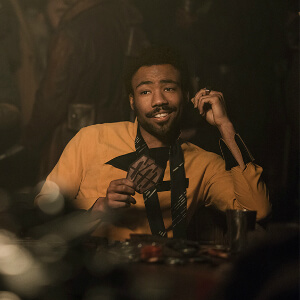 Howard, however, can’t fix acting performances completely as they mostly feel pulled from several different films. Ehrenreich deserves credit for bringing a battered innocence to Han’s character, making clear choices instead of just stepping comfortably into Harrison Ford’s impossibly large shoes. Woody Harrelson is effortlessly good (as always) in his role as Han’s mentee, Tobias Beckett. Thandie Newton also deserves a shout out as well, giving a brief, memorable performance.
Howard, however, can’t fix acting performances completely as they mostly feel pulled from several different films. Ehrenreich deserves credit for bringing a battered innocence to Han’s character, making clear choices instead of just stepping comfortably into Harrison Ford’s impossibly large shoes. Woody Harrelson is effortlessly good (as always) in his role as Han’s mentee, Tobias Beckett. Thandie Newton also deserves a shout out as well, giving a brief, memorable performance.
The rest of the performances, unfortunately, feel a bit jolted about. Donald Glover’s performance has been widely praised, even when it feels as if he’s busy playing a dressed up caricature of Billy Dee Williams rather than bringing his own spin to the role. Emilia Clarke, still working to break out of her Game of Thrones niche, feels a bit cold as Qi’Ra. It’s an admittedly hard part to play given the scripts twists and turns, but it almost feels as if she were instructed to meet those challenges with subtlety in what could have been a much showier, popcorny performance. And Paul Bettany, serving admirably as the leader of crime syndicate Crimson Dawn, is fine, though he feels as if he’s giving a compelling performance on a rushed time frame (which he probably was, as he replaced Michael Kenneth Williams when Lord and Miller were fired).
But if the script and performances are leaky, nothing else is. Star Wars technical mastery does not fail to amaze in Solo. Bradford Young’s camera is just as compelling and muted as his work in Arrival and Selma, capturing the environmental details and allowing the digital worlds to breathe even as we’re keyed in on every emotional and narrative beat. Young may be the movie’s saving grace in the end, as the way it looks and feels ends up informing the audience much more than the plot itself.
“You’re After Something. Is it Revenge? Money? Or Is It Something Else?”
Ultimately, though, the weight of Solo is carried on the back of its titular character, and the things he wants out of the universe he so desperately desires to see.
In the end… there’s not a whole lot we learn about him. In the original Star Wars, fans learned that the rogue with a mind for gold actually has a heart made of one too, risking his safety for the sake of the rebellion. None of this comes as a surprise to us, even as the events that unfold are technically happening years before.
However, this time we get to see the catalysts behind his devil-may-care personality and his much more invested heart. The Kasdans, for all the overworking they did, cleverly give us several options to choose from. Parent issues, love lost and love found, legacy, freedom… these are all things Han tastes and sees in his first adventures. Ultimately, none of them leave him with the satisfaction he desires, sending him farther into the galaxy to develop the hardened side of the man we’ll later see in A New Hope.
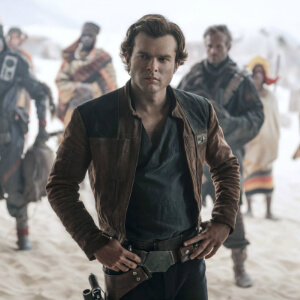 That these desires don’t fulfill Han is what the film ultimately rests on, asking us to explore with him and trust that he’s still searching by the time the credits roll. It may seem like a fruitless adventure by the time we’re through. And, by and large, it is. Solo doesn’t give us much of a deeper look at the character many Star Wars fans fell in love with, rather a few fresh faces and new settings where he can charm his way through space in the Millennium Falcon.
That these desires don’t fulfill Han is what the film ultimately rests on, asking us to explore with him and trust that he’s still searching by the time the credits roll. It may seem like a fruitless adventure by the time we’re through. And, by and large, it is. Solo doesn’t give us much of a deeper look at the character many Star Wars fans fell in love with, rather a few fresh faces and new settings where he can charm his way through space in the Millennium Falcon.
And yet, there’s value in the searching. By the film’s end, there’s a deep longing that is unsatisfied in both the man and the movie that share the same name. Maybe it’s intentional, maybe it’s not. It’s hard to tell with so many creative leaders at the helm. But it’s hard to imagine anyone could miss that the heart of Han’s desires is satisfaction itself. That it isn’t found in things that sound so wonderful — the dream girl, the money, the ship, the fame — sends Han and Chewy into hyperspace to continue the search.
As for us? We’re left to return to our very grounded lives, asking if there’s anything out there — in the stars or beyond — that can satisfy us in a way Han Solo wasn’t.

